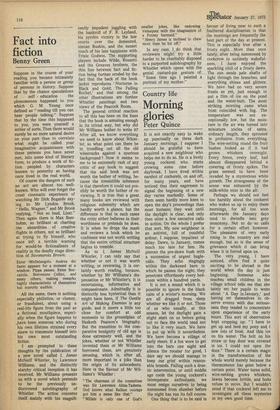Country life
Morning glories
Peter Quince
It is not exactly easy to wake up punctually on these dark January mornings. I suppose I should be grateful to have acquired a new neighbour who helps me to do so. He is a lively young cockerel who starts crowing some rime before daybreak. I have lived within earshot of cockerels, on and off, for many years, and have noticed that their eagerness to signal the beginning of a new day varies markedly. Some of them seem hardly more keen to open the day's proceedings than most humans; they wait until the daylight is clear, and only then utter a few tentative calls to action. On the whole I prefer that sort. My new neighbour is an activist, full of youthful ardour, I suppose, impatient of delay. Dawn, in January, comes much too late for him. He pierces the pre-dawn hush with a succession of urgent buglecalls. They echo ringingly within the darkened barn in which he passes the night; they penetrate effortlessly every bedroom within a hundred yards.
It is not a sound which it is possible to ignore in the black calm of a winter's morning. We are all dragged from sleep whether we like it or not. Those of us who usually, at this season, let the daylight gain a slight start on us before going out to face the world tend not to like it very much. We have to put up with it nevertheless. We have become a village of early risers. If a fox were to get into the barn one night and silence the rooster for good, I dare say we should manage to keep our grief within reasonable bounds. Failing such a drastic intervention, or until middle age cools the young cockerel's intemperate enthusiasm, we must resign ourselves to being summoned from slumber before the night has run its full course.
One thing that is to be said in favour of living near to such a feathered disciplinarian is that the mornings are frequently the best part of the day at present. This is especially true after a frosty night. More than once lately, after being summoned by cockcrow to untimely wakefulness, I have enjoyed the sparkling chill of a frosty dawn. The sun sends pale shafts of light through the branches, and everything shines and glitters. We have had no very severe frosts as yet, just enough to put a film of ice on the pond and the water-butt. The most striking morning came when frost coincided with fog. The temperature was not exceptionally low, but the moisture in the air was turned into miniature icicles of extraordinary length; they sprouted in profusion from everything. The wire-netting round the fruit bushes looked as if it had grown whiskers overnight. Every fence, every leaf, had almost disappeared behind a covering of frosty spikes. The grass seemed to have been invaded by a mysterious white growth. The strangeness of the scene was enhanced by the milk-white mist in the air.
Perhaps we should not feel too harshly about the cockerel who wakes us up to enjoy these mornings, for all too soon afterwards the January days tend to dwindle into grey monotony. Not to do so calls for a certain effort however. The pleasures of very early rising in the country are real enough, but so is the sense of grievance which it can bring when it is forced upon us.
The very young, I have noticed, often find it quite exciting to be abroad in the world when the day is just beginning. Someone who teaches small children in the village school tells me that she lately set •her pupils to write about A Day in January,' and having set themselves to observe events with due seriousness they tended to concentrate upon experience of the early hours. This sort of observation kept cropping up: "I have to get up and feed my pony and I saw lots of frost. And thin ice on his water. The bolt on his straw or hay door was covered in ice. I could not open the door." There is a certain magic in the transformation of the whole world merely because the thermometer has gone below a certain point. Water turns solid, wire-netting grows whiskers, lawns become brittle, and bolts refuse to move. But I wouldn't mind if that cockerel left me to investigate all these mysteries in my own good time.


































 Previous page
Previous page